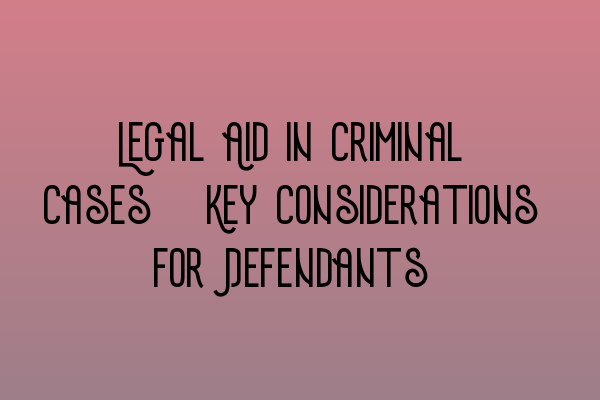Legal Aid in Criminal Cases: Key Considerations for Defendants
When facing criminal charges, every defendant has the right to legal representation. However, not everyone can afford the cost of hiring a private criminal defense lawyer. This is where legal aid comes into play. Legal aid provides assistance to individuals who are unable to pay for their own defense. In this article, we will explore the key considerations for defendants when it comes to legal aid in criminal cases.
Eligibility for Legal Aid
Before delving into the details, it’s important to understand the eligibility criteria for legal aid in criminal cases. Generally, legal aid is available to individuals who have a low income and are unable to afford a lawyer. The exact criteria may vary depending on the jurisdiction and the nature of the criminal offense.
It’s advisable for defendants to consult with a qualified criminal defense solicitor to determine their eligibility for legal aid. Solicitors at SQE Criminal Law & Practice Law UK can provide guidance and assess your eligibility based on your specific circumstances.
Benefits of Legal Aid
Legal aid offers several benefits to defendants in criminal cases. Firstly, it ensures equal access to justice, regardless of one’s financial situation. No one should be denied the right to fair representation due to their inability to pay.
Secondly, legal aid provides defendants with experienced and knowledgeable criminal defense solicitors who are well-versed in the complexities of criminal law. These solicitors can navigate the legal system on behalf of their clients, providing valuable guidance and advocacy throughout the process.
Furthermore, legal aid can cover the costs of expert witnesses, court fees, and other necessary expenses related to the defense. This helps level the playing field and allows defendants to present a strong case in court.
Limitations of Legal Aid
While legal aid is vital for ensuring access to justice, it does have certain limitations. One of the main limitations is the limited availability of funds. Budget constraints often result in limited resources and may lead to delays in providing legal aid to defendants.
Additionally, not all types of cases may be eligible for legal aid. In some jurisdictions, legal aid may only be available for specific types of criminal offenses or in certain circumstances.
Seeking Legal Aid
If you believe you are eligible for legal aid in a criminal case, it’s crucial to seek legal representation as soon as possible. Delaying the process could have a negative impact on your defense and overall outcome.
SQE Criminal Law & Practice Law UK offers a team of experienced solicitors who specialize in criminal law and are well-versed in the complexities of legal aid. They can guide you through the application process and ensure that you receive the appropriate legal aid for your case.
For further assistance, SQE Criminal Law & Practice Law UK also provides SQE 1 and SQE 2 preparation courses to help law students and aspiring solicitors prepare for their qualifying exams. You can find more information on our SQE 1 Preparation Courses and SQE 2 Preparation Courses pages.
Conclusion
Legal aid plays a crucial role in ensuring access to justice for defendants in criminal cases. It provides financial assistance and legal representation to individuals who cannot afford a private defense lawyer. By understanding the eligibility criteria, benefits, and limitations of legal aid, defendants can make informed decisions about their legal options.
If you require legal aid in a criminal case, do not hesitate to contact SQE Criminal Law & Practice Law UK. Our team of dedicated solicitors is committed to providing the best possible defense for our clients. To stay updated with the latest information regarding the SRA SQE exam dates, check out our SRA SQE Exam Dates page.
